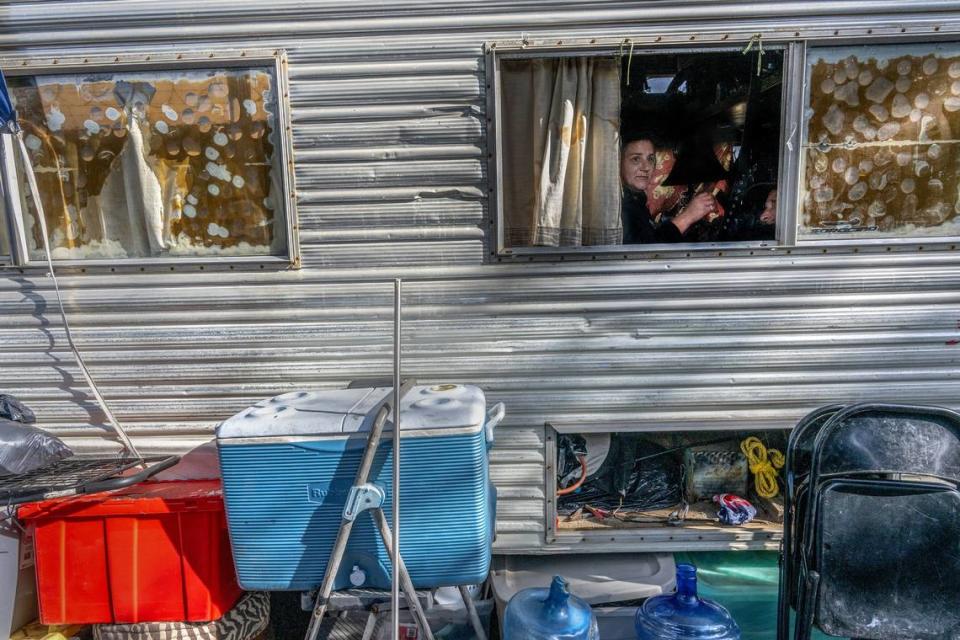Sacramento County approved $1.3M to help a homeless encampment. How did it vanish?
The Sacramento County Board of Supervisors voted in November to spend $1.3 million on a North Highlands parking lot for 30 homeless people. An official said the lot would help those who were “currently living in vehicles” on Roseville Road.
But they aren’t there.
Many of the residents meant to benefit from the parking lot at 4837 Watt Avenue were evicted from their encampments over the summer, months before the board’s vote. The missing encampments — which lined the road that crosses from the city of Sacramento into North Highlands’ county jurisdiction — show one of the pitfalls of these evictions: Such law enforcement action can undermine social services by causing agencies to lose track of the individuals they intended to help.
Phillip McCarthy, who handles contracts between his biohazard cleanup company and local government agencies, said Forensiclean workers cleared hundreds of thousands of pounds of materials from an 831-yard stretch of the road between June 26 and June 29, within city limits. He said that smaller cleanups happened on the county side of Roseville Road on July 13 and 14 — only 30 yards, and five to 10 tons of material.
Two Sacramento Bee reporters traveled Roseville Road two days after the supervisors discussed the encampments, seeking to ask people meant to benefit from the $1.3 million parking lot what they thought about it. However, no vehicles or RVs were parked on either side of the street. They saw only one small cluster of inaccessible RVs parked well off the street, on the other side of the railroad tracks.
Sacramento County submitted a grant application to the state earlier this year that The Bee obtained through a Public Records Act request. In that application, the county estimated 200 people lived along Roseville Road. The director of the Department of Homeless Services and Housing, Emily Halcon, had said at a Nov. 7 meeting that people were living on the road “currently.”
The week after the meeting, one of the reporters returned and again found no one camping in a vehicle on Roseville Road in the area the board had discussed. A month after the meeting, the reporter returned a third time and found four tents on the side of the road over the entire 7.5-mile stretch identified in the grant application.
The vanished encampment
Tim Swanson, a spokesman for the city of Sacramento, confirmed that on June 23, a code enforcement inspection found 41 vehicles in violation of various laws and ordinances. On June 28, he said, tow trucks removed 30 vehicles, most of them inoperable. Swanson said that in the weeks before the tows, social service workers did “intensive outreach.”
In a letter dated June 26 that was submitted as part of the county’s grant application, Sacramento Assistant City Manager Mario Lara wrote that he supported the “Safe Stay” site.
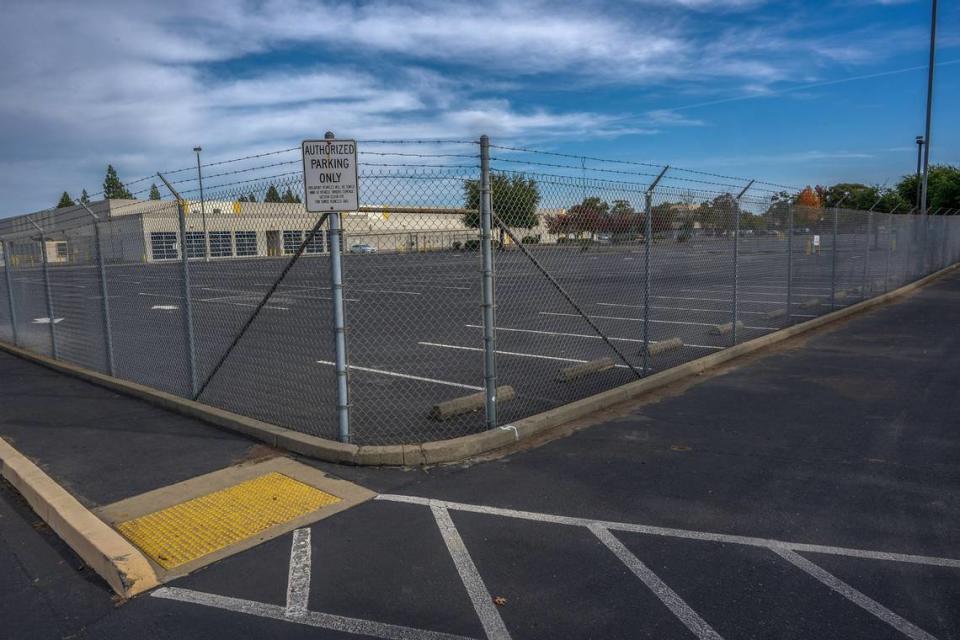
Lara said that the city would “continue to collaborate, in accordance to the City/County Homeless Services Partnership Agreement, to ensure the safety and wellness of people experiencing homelessness in encampments and support longer-term strategies for connecting individuals currently residing in encampments along Roseville Road with pathways to safe and stable housing.”
Two days after Lara signed that letter, the city did a huge sweep on the road. Ultimately, Swanson said, seven of the people living among those 41 vehicles went to the Auburn Boulevard Outreach and Engagement Center on Auburn Boulevard just east of Watt Avenue.
County spokeswoman Janna Haynes works with the Department of Homeless Services and Housing, but was not aware of the city sweep that happened in June. “It does appear that (there) was some enforcement that must’ve recently happened,” she wrote in response to The Bee’s questions.
This was at odds with what the county said in the grant application to the state. In the application, the county stressed that it would closely coordinate with the city on the intended project: “The County Department of Homeless Services and Housing will work closely with the City Department of Community Response ... for continued outreach and navigation coordination,” the application says. “Given the complex jurisdictional boundaries along Roseville Road, the only way to truly address these encampments is with a formal and coordinated partnership between the two jurisdictions.”
Referring to the area outside city limits, Haynes said she was not aware of any encampment evictions since March, the last time the Sacramento County Sheriff’s Office requested the relevant county social services team to accompany them on a sweep to offer people services. The Sheriff’s Office did not ask the county’s relevant social services team to accompany deputies and offer services to the homeless people being forced out of their makeshift homes for the sweep Forensiclean indicated may have happened in July.
The vanished homeless encampment, which multiple housed neighbors likened to “a city,” lays bare the precarious position of homeless residents in Sacramento County. A small number of homeless people still living in the area said the relentless pace of evictions has destabilized their lives as they scramble to pull themselves out of poverty.
On Nov. 9, two days after the vote, Rosita Howard’s RV was parked in unincorporated Sacramento County, right across from the planned safe parking site she had never heard of. A sheriff’s deputy had approached her just 30 minutes earlier, she said, to tell her she had to move somewhere else.
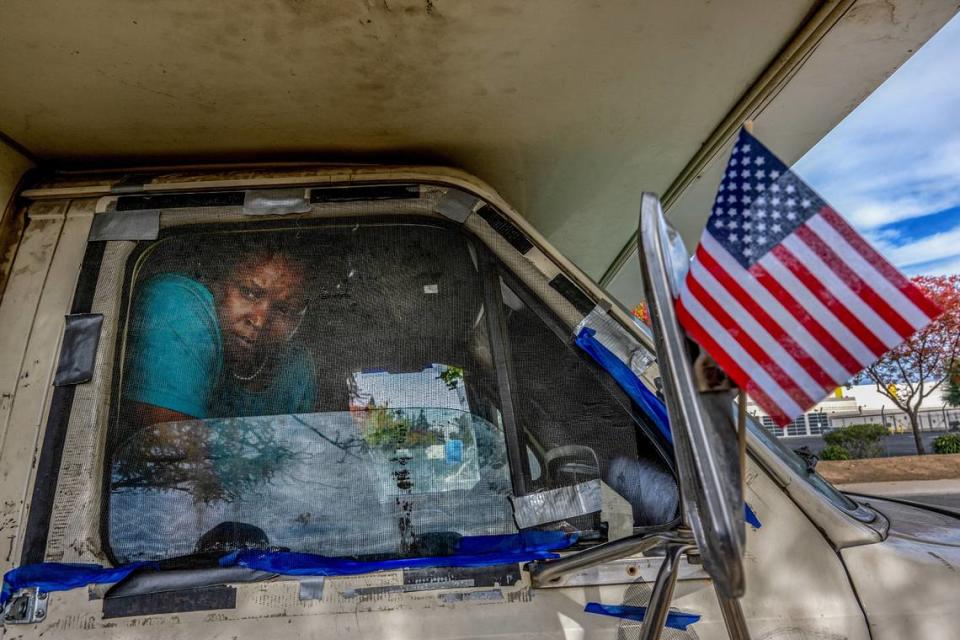
Howard, who grew up in Sacramento, said she wasn’t yet sure where she would go, or whether the RV she and her partner bought for a few hundred dollars five days earlier would start again.
When she’s been caught up in a sweep, Howard, 45, said she loses property and generally isn’t told where she can go, just that she has to leave.
“They take our stuff,” Howard said.
She said was evicted from her last permanent housing in 2020 after falling two months behind on rent. She and her partner, a veteran, have been struggling ever since: “I haven’t had any hope because I haven’t got any help yet.”
She said her partner has a decent income as a result of his military career, but they don’t have enough to scrape together a rental deposit, or to overcome their eviction record.
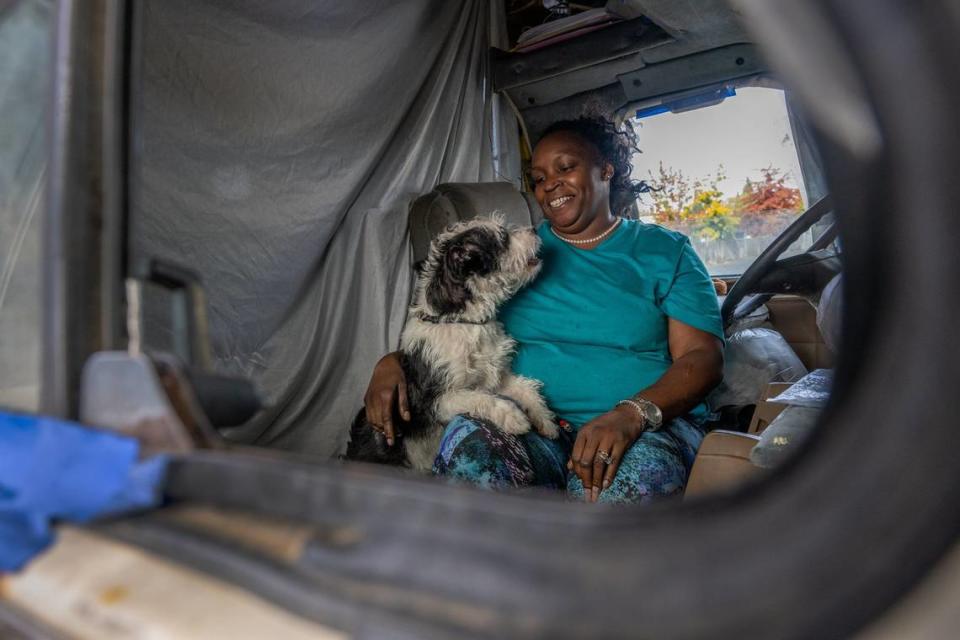
The Sheriff’s Office has not given a clear answer about what actions deputies took outside city limits. The department spokesman, Sgt. Amar Gandhi, said at first that it would take him “weeks, probably” to determine what happened on Roseville Road.
After two weeks elapsed, he said the information would only be available through a Public Records Act request, but declined to say what records The Sacramento Bee should ask for. Gandhi instead sent a link to the PRA portal and an instruction to “ask for whatever information you need for your article, via PRA.”
After the sheriff’s spokesman declined to provide any information and redirected the reporter to the public records process, The Bee filed a request for “bag and tag” logs related to the seizure of homeless residents’ property.
At the Nov. 7 board meeting during which the $1.3 million parking lot funding was approved, Halcon described the intention behind the request. Halcon, who leads the Department of Homeless Services and Housing, told supervisors that her department and the nonprofit contractor City Net agreed to set up a safe parking lot as an interim resource “because we recognize — it was brought up, I think, in just the last meeting — that there’s many people, especially in this area along Roseville Road and the McClellan Business Park and elsewhere, who are currently living in vehicles, and, therefore, really, are more challenging to transition into traditional shelters.”
Roseville Road runs in part through the county’s 3rd District, represented by Supervisor Rich Desmond. His staff also was unable to explain what had happened on the road. “There are still dozens of vehicles that use the area to park and sleep after hours,” he said in a written statement. “We also anticipate that some that have temporarily vacated the area will return.”
The $1.3 million Safe Stay parking lot that will be able to accommodate up to 30 individuals is expected to open in late January. In the interim, it seemed elected and appointed officials did not know where the people who were supposed to live there went.
Sweeps continue as undersheriff says ‘we don’t do sweeps’
At the same Nov. 7 board meeting, Undersheriff Mike Ziegler presented to the supervisors. Referring to a slideshow presentation, Ziegler said, “Notice that there was one stat up there you didn’t see, and that was the number of sweeps we do. We don’t do sweeps.”
Tracy Ruberto, 50, and her husband, Anthony Ruberto, 49, scoffed as they sat in their RV on a North Highlands side street.
“Oh, please,” Tracy said.
Anthony talked over her: “I could get a thousand people right now to tell you that’s a lie.”
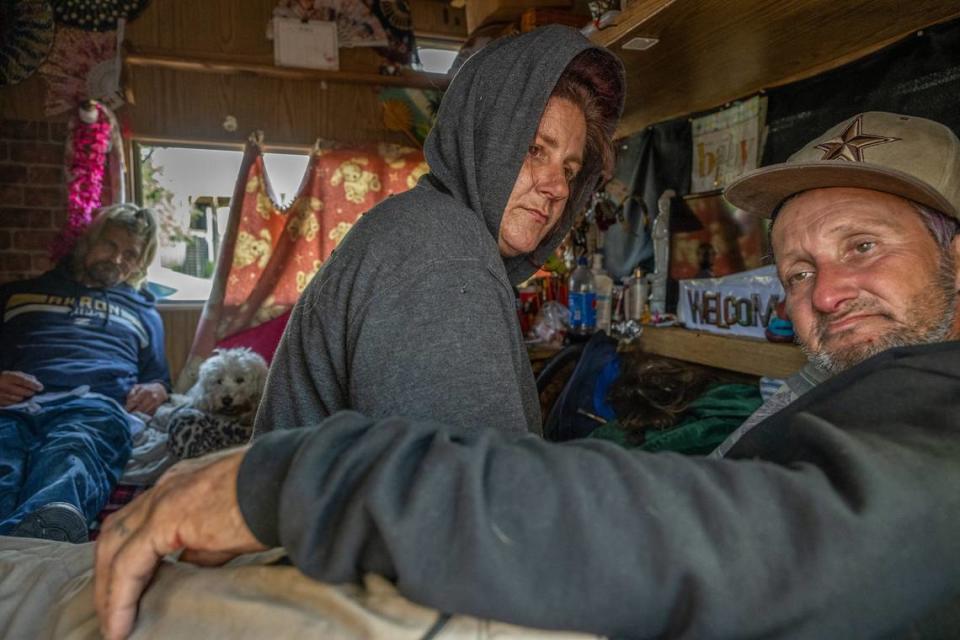
At the meeting, Ziegler said “if there’s environmental waste and hazards, we clean that up. But because of the Boise decision, we don’t move camps.”
The Boise decision is a 2018 9th U.S. Circuit Court of Appeals ruling that said, in part, that “as long as there is no option of sleeping indoors, the government cannot criminalize indigent, homeless people for sleeping outdoors, on public property, on the false premise they had a choice in the matter.” Sacramento County does not have nearly enough emergency shelter beds to accommodate its entire homeless population, with a shortfall of more than 6,000 spaces.
At the time they first spoke with The Bee, the Rubertos were living in their RV not far from the future Safe Stay lot. They hadn’t been on that side street for long, but they expected a sheriff’s deputy to show up soon and tell them to leave. “It’s any day now,” Tracy said. Anthony estimated that they’d been forced to pack up and move once a month for the more than two years that they’ve had the RV.
Often, the Rubertos said, they lose money and momentum when they have to move. Tracy explained, “Even to just start to get a job, you have to have something — you have to change your clothes.” During sweeps, she said, “They take your clothes from you. They take everything from you. How are you even gonna be presentable to get a job? You know, they’re taking people’s things. It’s just not right.”
